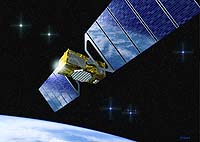
A Future Galileo GPS Bird
Fuente: SpaceDaily
 A Future Galileo GPS Bird |
The letter, first revealed by the Spanish daily El Pais Tuesday and seen by AFP, was dated December 1, signed by deputy US defense secretary Paul Wolfowitz and addressed to Belgian Defense Minister Andre Flahaut, whose office said they could not confirm having received it.
EU diplomatic sources said identical letters were received by several EU defense ministries.
"I am writing to convey my concerns about security ramifications for future NATO operations if the European Union proceeds with Galileo satellite navigation services that would overlay specturm of the global positioning system (GPS) military M-code signals," it said.
It said the US "plans a major modification to GPS to meet future military and civil requirements," with a significant feature of the new system being a "spectral separation of the GPS military M-code signals from civil signals."
"The addition of any Galileo services in the same specture... will significantly complicate our ability to ensure availability of critical GPS services in time of crisis or conflict and at the same time assure that adversary forces are denied similar capabilities," said the letter.
Wolfowitz said in the letter that "acceptable solutions can be found and that we can avert potentially serious impacts.
"I believe it is in the interest of NATO to preclude future Galileo signal development in spectrum to be used by the GPS M-code," he said, asking the ministers to inquire whether the EU intends to develop "military features" into Galileo and, "if so, we must examine... the security implications...."
He urged the defense ministers to convey his concerns to their respective transport ministers before an EU transport council December 7, at which the ministers failed to agree on the need for the multi-billion-dollar Galileo system.
There was no mention of the Wolfowitz warning in public accounts of that meeting.
But in Madrid, European Transport and Energy Commissioner Loyola de Palacio said Tuesday: "There was a letter and pressure exerted by the United States.
"American pressure against the Galileo project has increased since September 11," the date of the terrorist attacks on New York and Washington, she told reporters.
The EU summit at Laeken, Belgium, last weekend put off a decision on whether to proceed until next March.
"What we are lacking is a decision by the governments of the European Union," said de Palacio, dismissing suggestions the problem was one of money.
Cost of the project, which would ultimately involve placing and maintaining some 40 satellites in Earth orbit, is estimated at 3.6 billion dollars (4 billion euro).
She pointed to cost-ratio studies done for the commission that found the Galileo project would be 4.6 percent profitable.
"So the problem is not one of cost, but of a political decision" to go ahead, she said.
She added that, while awaiting an EU decision, she would "begin to analyze an alternative use of funds" set aside for this project, should no decision be made by March.
In Brussels, de Palacio's spokesman said the commission had already spent 82 million euros (74 million dollars) on studies and other preparations for Galileo, and acknowledged the "risk" that the money would be wasted.
"That's why the commission has said it is not going to carry out any further studies," he said. "We've done everything that was required...."